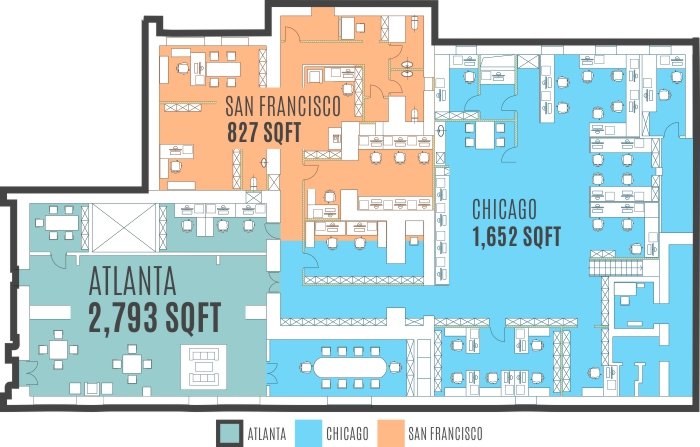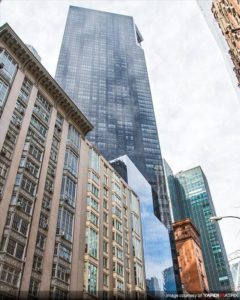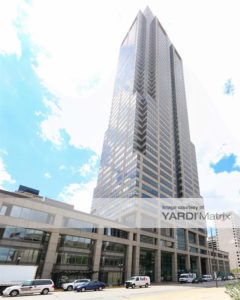Key Takeaways
- Nashville and Detroit: rising tech hubs, at half the price
- Indy and Kansas City, bustling startup scenes among most affordable office markets
- KC and NYC, 300% apart in office rents
Last August, Fortune looked at the Kauffman Foundation’s report on startup activity in 40 of the largest U.S. metros and presented a list of the 25 hottest cities for startups. We wanted to look at office rental rates in each market’s central business district (see “Methodology”)and felt that the list could use a few additions. Some already-established tech hubs, such as Seattle and Portland, were not among the 25 Fortune picks. Chicago, tech king of the Midwest, certainly could not have been left out of our office space price check. Moreover, up-and-coming startup scenes like Indianapolis and Detroit feature among Forbes’ list of cities creating the most tech jobs in 2017 and were well worth a look.
As Frank Herbert wrote, “a beginning is a very delicate time.” While growing a business, you have little leeway in terms of budget distribution, so everything that costs money must be selected carefully. Though the checklist of essentials is long, first thing’s first: LOCATION. Class A office space is found in the newest, best-looking buildings, and in the most sought-after commercial corridors, with the best access. Top-notch real estate, of course, comes at a hefty price. That’s why Class B could be a better bet on which to build–more affordable, more versatile, and generally in great shape, second-generation properties are worth considering when choosing the perfect office space for your startup. We found that, in terms of Class B office space rental rates, San Francisco takes the lead from NYC. What’s more, research shows that markets like Portland, Nashville, Chicago, and Detroit are viable cost alternatives to tech hubs established on both coasts.
Nashville and Detroit: Rising Tech Hubs, at Half the Price
Though not top-of-the-list in specifications, Class B space can easily offer what your small business needs and, most importantly, rental rates tend to be more startup-friendly, even in the center of town. To get a better sense of the difference in office space costs between markets, we considered a baseline of $5,000 a month, and calculated how much space that would get, in each of the 29 cities on the list. Among San Francisco office space, the Financial District came in ahead of Midtown NYC and narrowly took the top spot as most expensive office market–$5,000 a month gets you 827 square feet in San Francisco, on average, while in Manhattan you could stretch that to 1,023 square feet. Increasing demand for creative space has placed The City by the Bay in the lead among second-generation creative office space markets. This puts pressure on traditional office landlords to compromise, as well as sustaining the growth of the co-working space scene.
Also on the sunny side of the West Coast, the difference in rental prices between San Jose and downtown Los Angeles office space has become very small. So small, in fact, that $5,000 a month will get you 1,601 square feet of office space in the middle of L.A.’s central business district, while in San Jose that same budget would only stretch to another 44 square feet.
Just in case Silicon Valley doesn’t have room for everyone, remember that a Silicon Forest grows on the West Coast–on average, you can get 14% more office space in downtown Portland, Ore., than in downtown San Jose, for the same budget. Moreover, the average rental in San Jose is over 80% higher than the average apartment rent in Portland.
Traveling east, we find Nashville right in the sweet spot, in that office space continues to be affordable enough to keep it at record-high occupancy levels, and investor interest remains piqued. According to Colliers research, occupancy of Nashville office space stayed above 95% throughout 2016, despite the delivery of roughly 1.6 million square feet of new space. This is perhaps not surprising, considering that for $5,000 per month, you can get twice the office space in downtown Nashville that you can get in D.C. or in Boston.
Chicago, already one of the country’s most well-established traditional office markets, is primed for co-working space providers to swoop in and cater to the growing startup community. Goose Island, which is well on its way to becoming the country’s Silicon Island, has already attracted major providers like Spaces and Regus. According to the Chicago Tribune, the amount of office space occupied by co-working firms has grown from 49,000 square feet in 2007, to well over 1 million square feet today. For $5,000 a month, you can get an average of 1,652 square feet of Chicago office space, which is barely roomier than the 1,645 square feet that you could get in San Jose, but 44% less than the amount of office space you could rent in Detroit.
Motown, the great American revival city, is among the most affordable of the major U.S. office markets. Add to that Detroit’s vibrant, resilient community of spirited entrepreneurs, the city’s excellent national and international connectivity, and the fact that in downtown Detroit you can rent 2,951 square feet for $5,000 per month–almost three times the office space that you can get in Midtown Manhattan for the same budget, and you get what may be the country’s greatest comeback story.
Forbes declared earlier this year that Ohio is a great state for startups. Indeed, both Cincinnati and Columbus are well positioned in terms of office space affordability–for $5,000 per month, you can get over 3,000 square feet of office space in either city, right up there with the fertile startup environment of Baltimore.

An Atlanta CBD $5000/mo Class B office suite could fit a San Francisco and a Downtown Chicago equivalent, with room to spare
Indy and Kansas City, Bustling Startup Scenes among Most Affordable Office Markets
So where can you get the most office space for your green? A recent Techcrunch analysis shows that the Midwest is increasingly veering away from its reputation of being just a collection on flyover states. Indeed, as we have seen, major cities like Chicago, Detroit, and Columbus are affordable options for founding a business in markets that are well connected and offer great exposure. Out of the 29 metros we looked at, Indianapolis and Kansas City are neck and neck at the “most affordable” end of the chart–for $5,000 a month, you can get a 3,183-square-foot office in Indy, or stretch it to 3,289 square feet in Kansas City.
Home to Salesforce’s largest hub outside of its San Francisco global headquarters, Circle City is also making a play for Amazon’s second headquarters location. Indianapolis harbors what Forbes called a “mini tech hub on the move.” This emerging startup scene brought forth 20 of 2016’s Inc. 5000 list tech entries. Aside from being one of the most affordably-priced major U.S. office markets, Indianapolis also boasts a highly business-friendly economic environment, which incentivizes and supports innovation.
In 2011, Google chose Kansas City to be the first U.S. community in which the tech giant would roll out its ambitious Google Fiber project–a network that is set up to deliver symmetric 1 gigabit connections to households across the city. With this boost in information infrastructure, K.C.’s startup scene was granted a unique advantage. In a progressively digital economy, validation by a brand as big as Google is nothing short of a game changer. According to sources cited by Curbed, the city’s tech scene has since posted five consecutive years of job growth.
NYC and KC – 300% Apart in Class A Office Rents
Odds are, if you’re starting a small business in NYC, it will cost you a pretty penny to set up shop in Midtown, if you can even find an available space to call your own. However, at a time when small businesses are chased out of Manhattan by the rising costs of traditional office leases, co-working space providers like WeWork, Alley, and Ensemble (just to name a few) are doing their part to keep entrepreneurs in Midtown.

Metropolitan Tower, 142 W 57th St, Midtown (Yardi Matrix)
Let’s try a quick thought experiment: while average office asking rents in Manhattan exceed $79 per square foot, Midtown in particular has been seeing them averaging over $83. For a small start-up of five people, who require a minimum of 125 square feet of office space each, a 625-square-foot traditional office space in Midtown would cost $52,000 per year, on average, and would be signed for at least five years (which amounts to a total of $260,000).
Meanwhile, a private office with five seats at WeWork’s Metropolitan Tower co-working space, right on Billionaire’s Row, would start at $4,000 per month and come with onsite staff, cleaning services, conference facilities and private sound-proofed rooms, coffee and refreshments, as well as professional and social events.
Going further out, instead of the Class A office space you may be able to get for that $4,000 a month in the Midtown NYC co-working scene, you can get double in downtown Seattle, DTLA, Houston, and Chicago, or triple in downtown Phoenix, Nashville, Tampa, and Dallas, in a traditional lease arrangement. Indy and KCMO remain the markets where you can get the most space out of your rent money–roughly 300% more than what you would get in NYC, for the same budget.
Check out the handy calculator below and see how much office space your business needs and how much that space would cost in each of the markets we researched.
Ready to sign a lease? Check out some of the top commercial real estate markets in the U.S. from our selection and make your choice:
Methodology
- CBD rent values shown are calculated based on both average asking rents and direct rents reported in Q2 2017 market research by CBRE, Colliers, Cushman&Wakefield, JLL, NAI Partners, and Savills Studley.
- Riverside not included in our analysis, for lack of sufficient office rental data
- The office space calculator factors in traditional rental rate averages for each market and shows the average rent per year of a hypothetical traditional lease arrangement for the resulting office space required.











